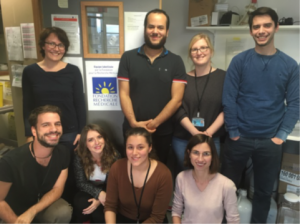Kerafast Community Profile: Amandine Blanco, Lab Manager at the University of Lyon
At Kerafast, we understand that lab managers play a vital role in the research community through their indispensable contributions to the lab. This past holiday season, we invited our community of scientists to nominate their lab manager to enter a random drawing for the chance to win a $1000 gift card plus $250 for their respective labs. One of our two winners was Amandine Blanco from the University of Lyon.
 Amandine is a lab manager in the Salcedo Lab at the University of Lyon. The lab strives to understand how bacterial proteins behave during infection and study how these molecules regulate cellular pathways to lead to disease. What are some of the pathogens they are currently studying? Brucella spp., Acinetobacter, Pseudomonas. These pathogens are typically multi-drug resistant, leading to high rates in morbidity and mortality in developing countries.
Amandine is a lab manager in the Salcedo Lab at the University of Lyon. The lab strives to understand how bacterial proteins behave during infection and study how these molecules regulate cellular pathways to lead to disease. What are some of the pathogens they are currently studying? Brucella spp., Acinetobacter, Pseudomonas. These pathogens are typically multi-drug resistant, leading to high rates in morbidity and mortality in developing countries.
We spoke with Amandine to learn more about her role as a lab manager in the Salcedo Lab. Amandine shared her passion for research (and cooking), any advice she has for young researchers, and how Marie Curie inspires her.
See below for Amandine’s full interview.
1. What does a typical day look like in your position?
Biosafety management and monitoring of bacteriological laboratories at Biological Safety Levels 2 and 3 (BSL2 and BSL3), including the legislation associated with highly pathogenic microorganisms and toxins are my main missions. In parallel, I have a research project that involves lots of cell culture, experiments in the BSL3 and long microscopy sessions to image infected cells. I also supervise trainees.
2.What area of research does your lab focus on?
The laboratory conducts studies on the understanding of host-pathogen interactions. More precisely the studies target the characterization of bacterial proteins targeting the host cellular pathways. Some key pathogens under investigation: Acinetobacter, Pseudomonas and Brucella. We are particularly interested in characterizing bacterial proteins injected into host cells during infection and how they modulate cellular responses.
3.Why did you decide to pursue a career in research? What do you enjoy about the field?
Understanding and discovering new things have always attracted me. What I love in research is the possibility to use several approaches and various techniques to carry out a project to answer a biological question.
4.What are some recent trends in your field of research, and where do you see future research moving towards?
Bacterial targeting of the nucleus is a major virulence strategy shared by a number of plant and animal pathogens. In order to manipulate nuclear functions and eukaryotic gene expression, bacteria inject into host cells nuclear-targeting effector proteins, known as nucleomodulins. We have recently identified two such effectors from Brucella, the causative agent of brucellosis, considered by the World Health Organisation to be one of the most widespread bacterial zoonosis worldwide. Understanding how these bacterial effectors are impacting the nuclear functions to cause disease and perhaps in a permanent manner that could have a long-term epigenetic impact on the host is an exciting field that is developing.
5.What advice do you have for young researchers looking to pursue this career?
Perseverance and patience are my two main pieces of advice for young researchers.
6.What is a technology that interests you that you wish you knew more about?
Microscopy is an amazing field, that can generate important data. It would be great to further develop my knowledge on this constantly evolving technology.
7.What activities outside of work are passionate about? What do you like to do in your free time?
All activities related to nature, such as hiking. Otherwise cooking with my son, do-it-yourself are some daily activities that I really enjoy.
8.Who is your favorite scientist, and in what ways are you inspired by them?
Marie Curie is my favorite scientist, she is an inspiration both for her scientific and feminist commitments.
9.How would you friends describe you?
People describe me as a smiling and tenacious person.
10.Lastly, what would you say is the most important part of being an effective manager?
Be a trustworthy person.
Related Research
Do you work in this field of research? If so, you may be interested in viewing our other reagents that might be related to bacterial research. Some of the reagents include:


